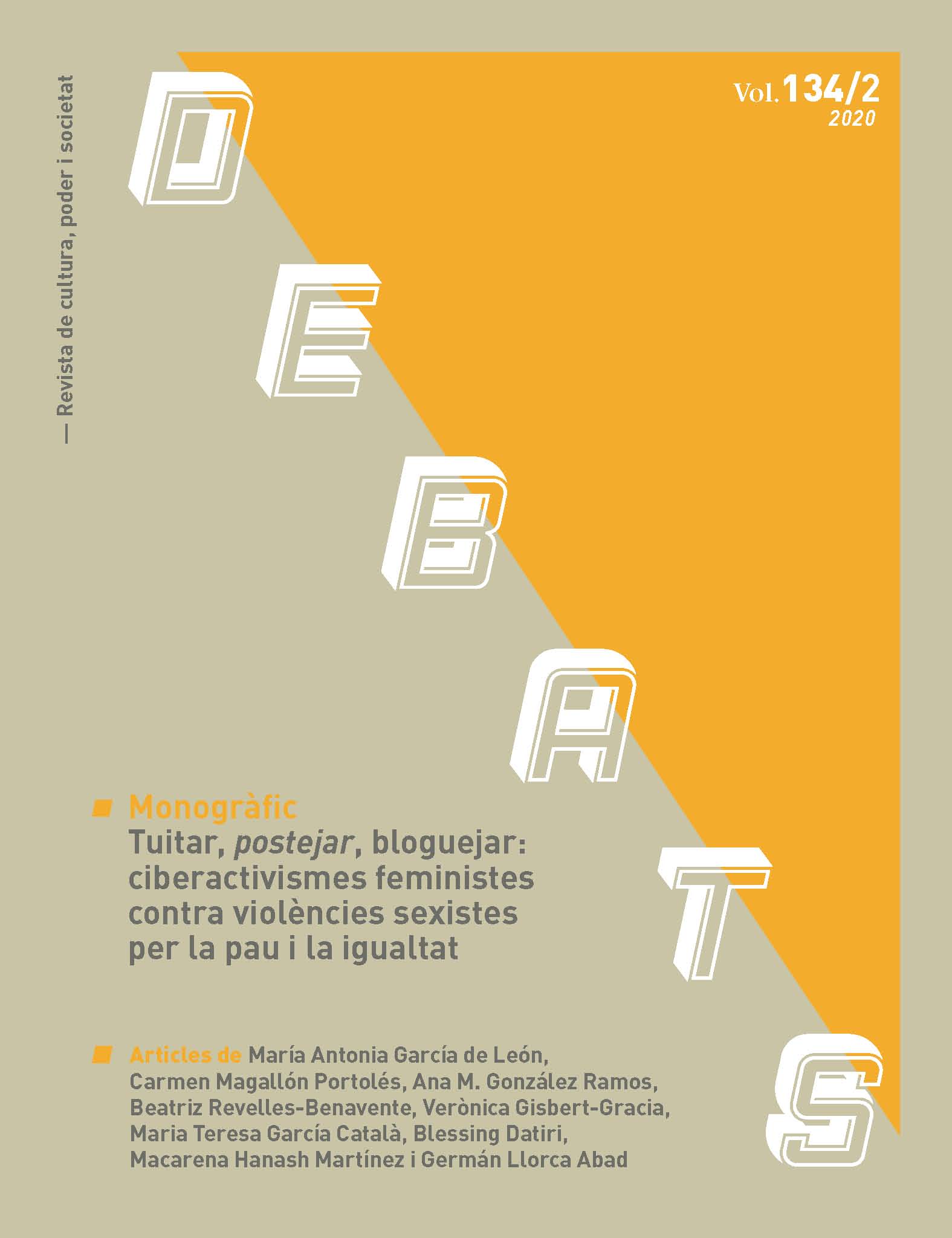Introduction to the Special Issue. Tweeting, Posting, Blogging: Feminist features in the battle against sexist violence and for peace and equality
DOI:
https://doi.org/10.28939/iam.debats.134-2.1Abstract
Les eines digitals han inaugurat una nova era per als moviments socials (Castells, 2012; Rovira, 2017), la lluita dels col·lectius organitzats en favor de la defensa dels seus drets, la igualtat i la salvaguarda dels drets humans. En el camp dels feminismes, el hacktivisme, concepte que designa l’activisme a través de les xarxes socials, persegueix a consciència la violència de gènere i l’assetjament que pateixen, sobretot, les dones i
les persones menors d’edat. Les eines digitals connecten la societat civil, l’articulen i difonen els missatges per demanar atenció i exigir-ne una reparació (Dean i Aune, 2015; Friedman, 2015; Chamberlain, 2017). En un món global i connectat a partir de molts trets en comú i distincions a causa de les diverses situacions de desigualtat i violències estructurals (Massey, 1994; Sassen, 2007, 2015), les xarxes socials i la seua agilitat de
comunicació amenacen la contextualització, l’experiència situada i l’empatia de qui acumula un posicionament condicionat per la relacionalitat interseccionada (Haraway, 1988; Creswley, 1989; Collins, 2000).
Downloads
References
Anderlini, S. N. (2018). Challenging Conventional Wisdom, Transforming Current
Practices: A Gendered Lens on PVE, Transforming Current Practices. En B. Austin y H. J. Giessmann (ed.), Transformative Approaches to Violent Extremism. Berlín: Berghof
Foundation.
Bloom, M. (2011). Bombshell: Women and Terrorists. Londres: Hurst.
Bunch, C. (2001). Women’s Human Rights: The Challenges of Global Feminist and
Diversity. En M. DeKoven (ed.), Feminist Locations: Global and Local, Theory and
Practice. New Brunswick: Rutgers.
Castells, M. (2012). Networks of Outrage and Hope. Londres: Cambridge Polity Press.
Crenshaw W., K. (1989). Demarginalizing the Intersection of Race and Sex: A Black
Feminist Critique of Antidiscrimination Doctrine, Feminist Theory and Antiracist
Politics. University of Chicago Legal Forum, 1989, article 8.
Collins, P. H. (2000). Black Feminist Thought: Knowledge, Consciousness and the Politics of
Empowerment. Nueva York: Routledge.
Chamberlain, P. (2017). The Feminist Fourth Wave: Affective Temporality. Palgrave Macmillan.
Dean, J. y Aune, K. (2015). Feminism Resurgent? Mapping Contemporary Feminist
Activisms in Europe. Social Movement Studies, 14(4): 375-395.
Friedman, E. J. (1995). Women’s Human Rights: The Emergence of a Movement. En J.
S. Peters y A. Wolper (1995), Women’s Right, Human Rights (p. 18-35). Nueva York:
Routledge.
Friedman, E. J. (2005). The Reality of Virtual Reality: The Internet and Gender Equality
Advocacy in Latin America. Latin American Politics and Society, 47, 1-34.
Haraway, D. (1988). Situated Knowledges: The Science Question in Feminism and the
Privilege of Partial Perspective. Feminist Studies, 14(3), 575-599.
hooks, b. (1986). Ain’t I a Woman: Black Women’s Rights Feminism. Londres: Pluto Press.
Khoja-Moolji, S. (2015). Becoming an ‘Intimate Publics’: Exploring the Affective Intensities
of Hashtag Feminism’. Feminist Media Studies, 15(2), 347-350.
Leatherman, J. L. (2014). Violencia sexual y conflictos armados (Ana y Maria Villellas, trad.).
Barcelona: Edicions Bellaterra.
Magallón, C. (2010). Decidir en los procesos de paz, un derecho de hombres y mujeres.
¿Qué ha aportado la resolución 1325 del Consejo de Seguridad? Papeles de relaciones
ecosociales y cambio global, 109, 45-56.
Magallón, C. (2012). Contar en el mundo. Una mirada sobre las relaciones internacionales
desde las vidas de las mujeres. Madrid: Horas y horas.
Massey, D. B. (1994). Space, Place, and Gender. Mineápolis: University of Minnesota Press.
Maxfield, M. (2016). History Retweeting Itself: Imperial Feminist Appropriations of ‘Bring
Back Our Girls’. Feminist Media Studies, 16(5), 886-900.
Mohanty, C. T. (1984). Under Western Eyes: Feminist Scholarship and Colonial Discourses.
Boundary 2, 12(3), 333-358.
Rovira, G. (2017). Activismo en red y multitudes conectadas: Comunicación y acción en la era
de Internet. Barcelona: Icaria.
Sassen, S. (2007). Una sociología de la globalización. Buenos Aires: Katz Editores.
Sassen, S. (2015). Expulsiones. Buenos Aires: Katz Editores.
Segato, R. (2016). La guerra contra las mujeres. Madrid: Traficantes de sueños.
Downloads
Published
How to Cite
Issue
Section
License
Without prejudice to the provisions of article 52 of Spanish Law 22/1987 of November 11 on Intellectual Property, BOE (official state bulletin) of November 17, 1987, and pursuant to said legislation, the author(s) surrender(s) free of charge its rights of edition, publication, distribution and sale of the article, for its publication in Debats. Journal on Culture, Power and Society.
Debats. Journal on Culture, Power and Society is published under the Creative Commons license system in accordance with the «Recognition - Non-Commercial (by-nc) modality: The generation of derivative works is permitted provided that commercial use is not made. Nor can the original work be used for commercial purposes».
Thus, when the author submits his/her contribution, he/she explicitly accepts this assignment of publishing and publishing rights. Authors also authorize Debats. Journal on Culture, Power and Society to include their work in an issue of the journal to be distributed and sold.











